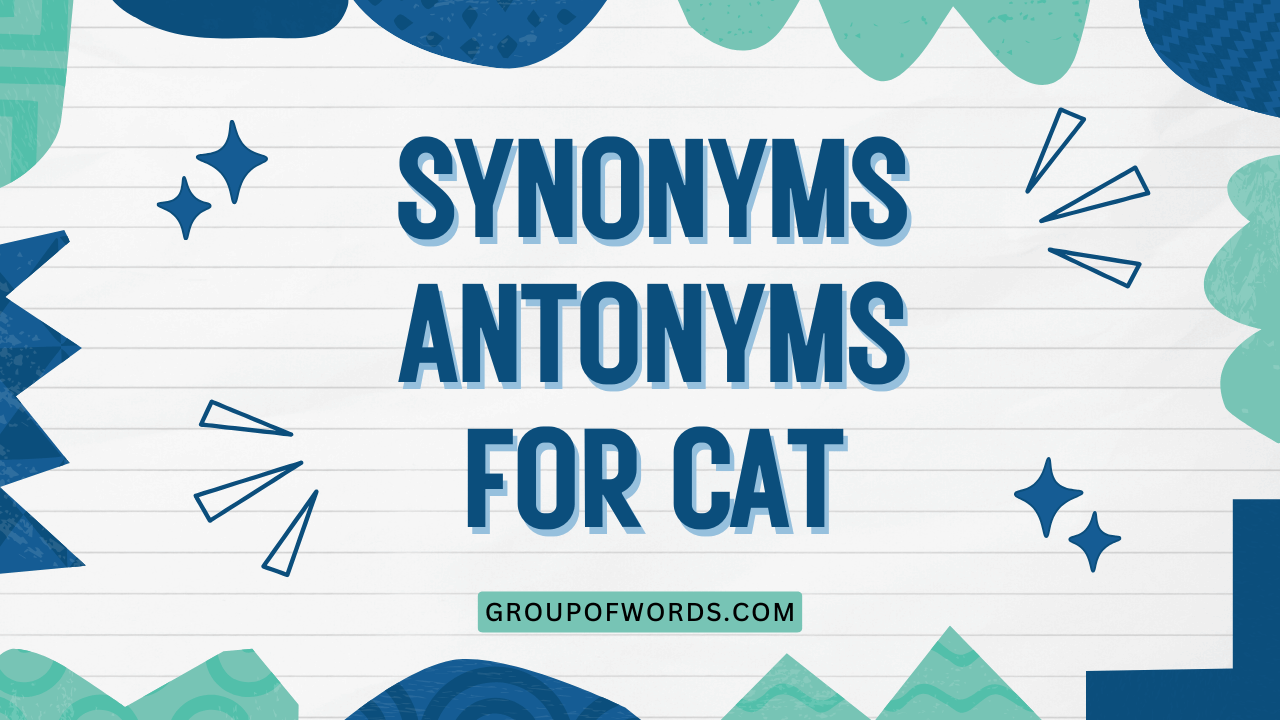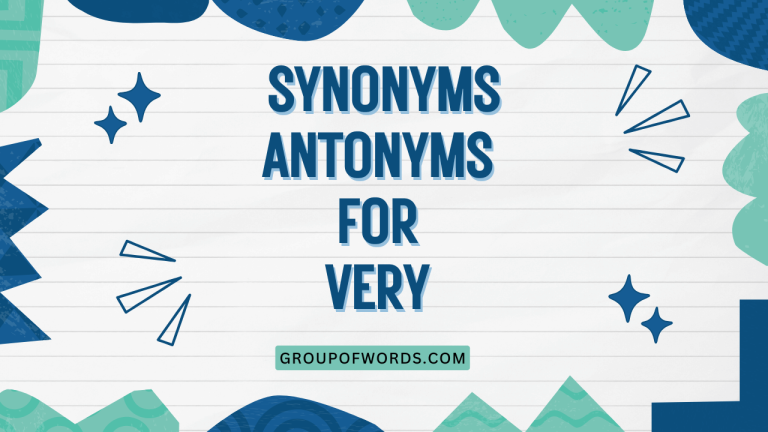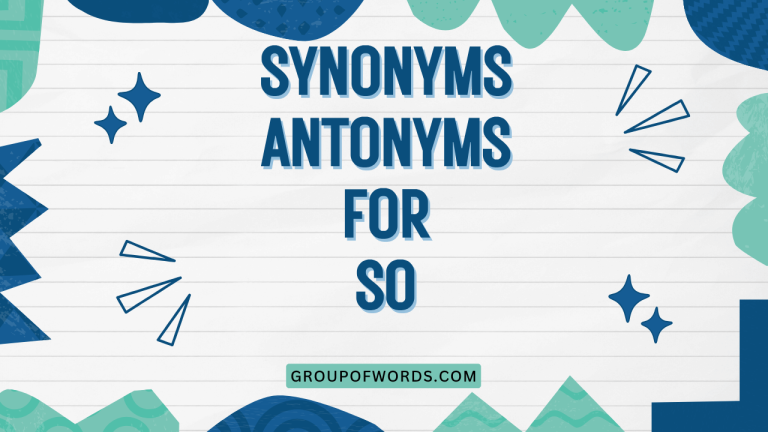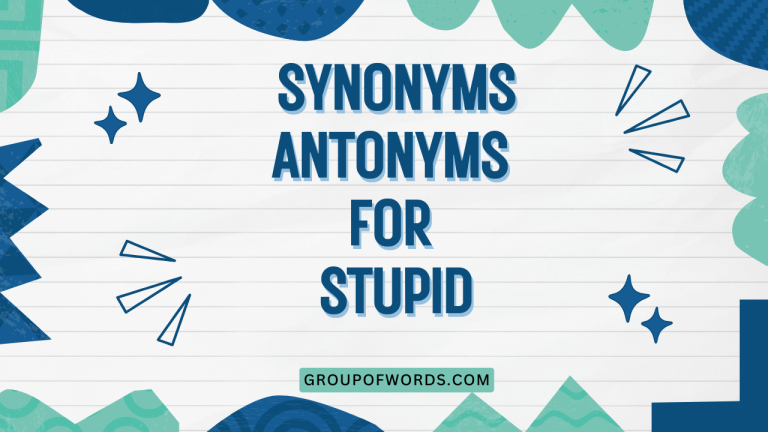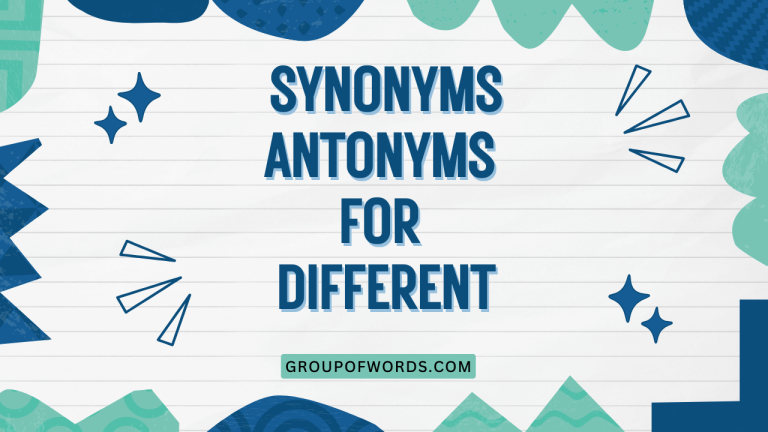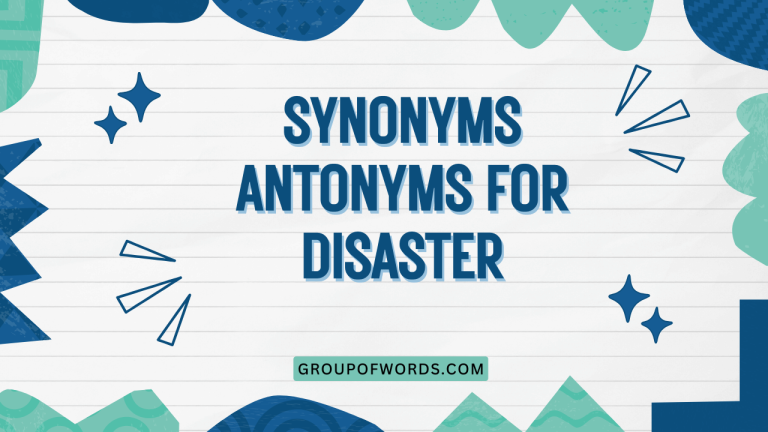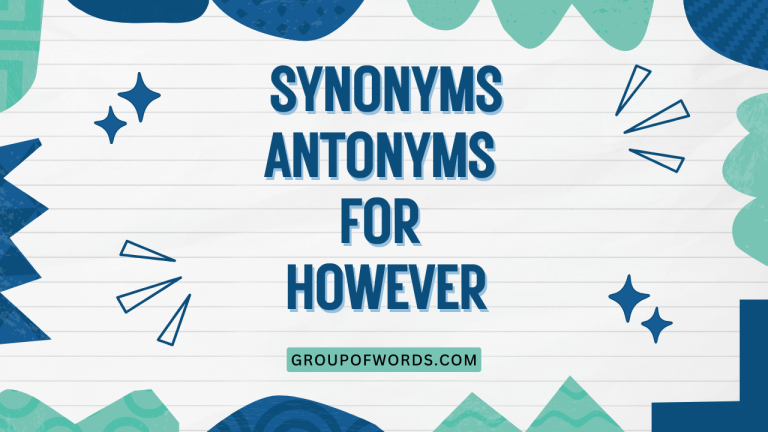Synonyms and Antonyms for “Cat”: A Comprehensive Guide
Understanding synonyms and antonyms is crucial for expanding your vocabulary and improving your communication skills. This article delves into the synonyms and antonyms for the word “cat,” exploring its various meanings and contexts.
Whether you’re a student, writer, or simply someone looking to enhance your language proficiency, this guide will provide you with a comprehensive understanding of words related to “cat.” By exploring these relationships, you will gain a deeper appreciation for the nuances of the English language and improve your ability to express yourself clearly and effectively.
Table of Contents
- Introduction
- Definition of “Cat”
- Synonyms for “Cat”
- Antonyms for “Cat”
- Examples of Usage
- Usage Rules
- Common Mistakes
- Practice Exercises
- Advanced Topics
- FAQ
- Conclusion
Definition of “Cat”
The word “cat” primarily refers to a small, domesticated carnivorous mammal with soft fur, a short snout, and retractable claws. Scientifically known as Felis catus, cats are popular pets worldwide, known for their agility, independence, and hunting instincts. Beyond the literal animal, “cat” can also be used informally to refer to a person, often in a derogatory or slang manner. Understanding the context is crucial to interpreting the meaning of “cat” correctly.
In addition to its primary meaning, “cat” can also refer to various other things depending on the context. For example, in jazz slang, “cat” can refer to a musician.
It’s important to consider the surrounding words and the overall situation to determine the intended meaning. This versatility makes understanding synonyms and antonyms even more important.
Synonyms for “Cat”
Synonyms for “cat” vary depending on the context. Here’s a breakdown of different types of synonyms:
Feline Synonyms
These synonyms are used when referring to the animal itself:
- Feline: This is a formal term referring to the cat family (Felidae).
- Kitten: A young cat.
- Tomcat: A male cat.
- Queen: A female cat.
- Mouser: A cat known for catching mice.
- Puss/Pussycat: Informal, often affectionate terms.
The following table provides a list of sentences using synonyms for “cat” in the feline context:
| Original Sentence | Sentence with Synonym |
|---|---|
| The cat jumped onto the fence. | The feline jumped onto the fence. |
| The cat is playing with a ball of yarn. | The kitten is playing with a ball of yarn. |
| The cat sprayed in the garage. | The tomcat sprayed in the garage. |
| The cat gave birth to five kittens. | The queen gave birth to five kittens. |
| The cat is very effective at catching mice. | The mouser is very effective at catching mice. |
| The cat is sleeping on the couch. | The pussycat is sleeping on the couch. |
| The cat purred softly. | The feline purred softly. |
| The cat chased the laser pointer. | The kitten chased the laser pointer. |
| The cat marked its territory. | The tomcat marked its territory. |
| The cat groomed its fur meticulously. | The queen groomed its fur meticulously. |
| The cat kept the barn free of rodents. | The mouser kept the barn free of rodents. |
| The cat curled up on my lap. | The pussycat curled up on my lap. |
| The cat stalked its prey in the garden. | The feline stalked its prey in the garden. |
| The cat batted at the dangling toy. | The kitten batted at the dangling toy. |
| The cat roamed the neighborhood at night. | The tomcat roamed the neighborhood at night. |
| The cat nursed her young protectively. | The queen nursed her young protectively. |
| The cat was a valuable asset to the farm. | The mouser was a valuable asset to the farm. |
| The cat seemed to enjoy being petted. | The pussycat seemed to enjoy being petted. |
| The cat’s graceful movements were mesmerizing. | The feline’s graceful movements were mesmerizing. |
| The cat explored every nook and cranny of the house. | The kitten explored every nook and cranny of the house. |
| The cat fought off other males for dominance. | The tomcat fought off other males for dominance. |
| The cat carefully chose a safe place to give birth. | The queen carefully chose a safe place to give birth. |
| The cat diligently hunted for rodents in the field. | The mouser diligently hunted for rodents in the field. |
| The cat always greeted me with a gentle meow. | The pussycat always greeted me with a gentle meow. |
Slang Synonyms
These synonyms are used in informal contexts, often to refer to a person:
- Dude: Informal term for a man.
- Guy: Common term for a man.
- Fellow: A man, often used in a slightly formal way.
- Character: A person, often with distinctive qualities.
- Individual: A person, emphasizing uniqueness.
The following table provides examples of sentences using slang synonyms for “cat”:
| Original Sentence | Sentence with Synonym |
|---|---|
| He’s a cool cat. | He’s a cool dude. |
| That cat knows what he’s doing. | That guy knows what he’s doing. |
| He’s a strange cat. | He’s a strange fellow. |
| She’s a real cool cat. | She’s a real cool character. |
| He’s an interesting cat. | He’s an interesting individual. |
| That cat is always causing trouble. | That guy is always causing trouble. |
| He’s one smooth cat. | He’s one smooth dude. |
| He’s a real sly cat. | He’s a real sly guy. |
| He’s a tough cat to deal with. | He’s a tough fellow to deal with. |
| She’s quite the cool cat. | She’s quite the cool character. |
| He’s a unique cat, that’s for sure. | He’s a unique individual, that’s for sure. |
| Who’s that cat over there? | Who’s that guy over there? |
| He’s a laid-back cat. | He’s a laid-back dude. |
| He’s a dependable cat. | He’s a dependable guy. |
| He’s a peculiar cat, isn’t he? | He’s a peculiar fellow, isn’t he? |
| She’s a fascinating cat to talk to. | She’s a fascinating character to talk to. |
| He’s a complex cat to understand. | He’s a complex individual to understand. |
| That cat is always up to something. | That guy is always up to something. |
| He’s one cool cat to hang out with. | He’s one cool dude to hang out with. |
| He’s a trustworthy cat. | He’s a trustworthy guy. |
| He’s a respectable cat in the community. | He’s a respectable fellow in the community. |
| She’s a very interesting cat to know. | She’s a very interesting character to know. |
| He’s a very unique cat I’ve ever met. | He’s a very unique individual I’ve ever met. |
| That cat always has a story to tell. | That guy always has a story to tell. |
Other Contextual Synonyms
In some contexts, “cat” might refer to something else entirely. For instance, in construction, a “cat” might be short for “caterpillar,” referring to heavy machinery.
- Caterpillar: A brand of heavy machinery.
Here’s an example:
| Original Sentence | Sentence with Synonym |
|---|---|
| The cat was used to clear the land. | The caterpillar was used to clear the land. |
Antonyms for “Cat”
Finding direct antonyms for “cat” can be tricky, as it largely depends on the context. Here’s how we can approach finding antonyms:
Antonyms in a Feline Context
Since “cat” is a specific animal, there isn’t a direct opposite. However, we can consider animals that are often contrasted with cats:
- Dog: Often considered the opposite of a cat in terms of behavior and temperament.
- Rodent (Mouse, Rat): Natural prey of cats.
Here are some examples:
| Original Sentence | Sentence with Antonym |
|---|---|
| I prefer cats to other pets. | I prefer dogs to other pets. |
| The cat chased the mouse. | The cat chased its prey, the mouse. |
| Cats are independent animals. | Dogs are often more dependent animals. |
Antonyms in Slang Context
If “cat” refers to a person, antonyms depend on the implied meaning. If “cat” implies someone cool or knowledgeable, antonyms could include:
- Nerd: Someone uncool or socially awkward.
- Ignoramus: Someone lacking knowledge.
- Square: Someone conventional and unhip.
Here are some examples:
| Original Sentence | Sentence with Antonym |
|---|---|
| He’s a cool cat. | He’s a complete nerd. |
| That cat knows nothing. | That ignoramus knows nothing. |
| He’s a real cat. | He’s a real square. |
Examples of Usage
Here are more examples to illustrate the use of synonyms and antonyms for “cat” in various contexts:
| Context | Original Sentence | Synonym | Antonym |
|---|---|---|---|
| Feline | The cat slept soundly. | Feline | Dog |
| Slang | He’s a cool cat. | Dude | Nerd |
| Construction | The cat cleared the site. | Caterpillar | Manual Labor |
| Feline | The cat stalked its prey. | Mouser | Vegetarian Animal |
| Slang | That cat is always up to something. | Guy | Saint |
| Feline | The cat purred contentedly. | Pussycat | Growling Dog |
| Slang | He’s a smooth cat. | Fellow | Awkward Person |
| Feline | The cat groomed its fur. | Queen | Male Dog |
| Slang | She’s a fascinating cat. | Character | Boring Person |
| Feline | The cat played with the yarn. | Kitten | Old Dog |
| Slang | He’s a complex cat to figure out. | Individual | Simpleton |
| Feline | The cat marked its territory. | Tomcat | Neutered Dog |
| Slang | That cat is always causing mischief. | Dude | Angel |
| Feline | The cat hunted in the garden. | Feline | Herbivore |
| Slang | He’s a sly cat. | Guy | Naive Person |
| Feline | The cat curled up on the rug. | Pussycat | Wild Animal |
| Slang | He’s a cool cat to hang out with. | Fellow | Bore |
| Feline | The cat nursed her young. | Queen | Male Animal |
| Slang | She’s a unique cat to know. | Character | Ordinary Person |
| Feline | The cat kept the mice away. | Mouser | Rodent Magnet |
| Slang | He’s a dependable cat. | Individual | Unreliable Person |
| Feline | The cat chased the laser pointer. | Kitten | Old Feline |
| Slang | That cat always has a story. | Dude | Quiet Person |
Usage Rules
When using synonyms and antonyms for “cat,” consider these rules:
- Context is key: Always consider the context in which “cat” is used. Is it referring to the animal, a person, or something else?
- Formality: Choose synonyms that match the formality of your writing or speech. “Feline” is more formal than “pussycat.”
- Connotation: Be aware of the connotations of your chosen word. Some slang terms for “cat” can be derogatory.
- Clarity: Ensure your chosen synonym or antonym maintains clarity. Avoid using obscure or confusing words.
For example, when writing a scientific paper about animal behavior, using “feline” is appropriate. However, when talking casually with friends, “pussycat” or “kitty” might be more suitable.
Similarly, using slang terms like “dude” or “guy” is appropriate in informal conversations but not in formal writing.
Common Mistakes
Here are some common mistakes to avoid when using synonyms and antonyms for “cat”:
| Incorrect | Correct | Explanation |
|---|---|---|
| The feline is a cool cat. | The guy is a cool cat. | Mixing formal and informal language. |
| The dog chased the feline. | The dog chased the cat. | Using an overly formal term in a simple sentence. |
| He’s a nerd cat. | He’s a nerdy guy. | Incorrectly combining antonyms and the original word. |
| The caterpillar purred on the couch. | The cat purred on the couch. | Using synonym for a non-animal context when the sentence describes an animal. |
Practice Exercises
Test your understanding with these exercises:
- Replace “cat” with a synonym in the following sentence: “The cat jumped over the lazy dog.”
- What is an antonym for “cat” in the context of pets?
- Rewrite the sentence using a slang synonym for “cat”: “He’s a cool cat.”
- Identify the context in which “cat” is used in the following sentence: “The cat was used to level the ground.”
- Replace “cat” with a more formal synonym: “My cat loves to play with yarn.”
- What is an antonym for “cat” if “cat” is used to describe a knowledgeable person?
- Rewrite the sentence using a synonym that emphasizes the cat’s role as a hunter: “The cat caught a mouse.”
- What is the best synonym for “cat” in the sentence: “The female cat gave birth to kittens.”
- Provide a synonym for “cat” when referring to a friendly person.
- What is an antonym for “cat” if “cat” is used to describe someone conventional?
Answers:
- The feline jumped over the lazy dog.
- Dog
- He’s a cool dude.
- Construction/Heavy Machinery
- My feline loves to play with yarn.
- Ignoramus
- The mouser caught a mouse.
- Queen
- Guy
- Rebel
More Practice Exercises:
| Question | Answer |
|---|---|
| Choose the best synonym for “cat” in the sentence: “The ____ gracefully stalked its prey.” | Feline |
| What is an antonym for “cat” in the context of a cool person? | Square |
| Replace “cat” with a synonym in the sentence: “The ____ is known for its agility and independence.” | Feline |
| What animal is often considered the opposite of a cat? | Dog |
| Rewrite the sentence using a slang synonym for “cat”: “That ____ is always causing trouble.” | Guy |
| In what context might “cat” refer to heavy machinery? | Construction |
| Replace “cat” with a more formal synonym: “My ____ enjoys sleeping in sunbeams.” | Feline |
| What is an antonym for “cat” if it is used to describe a knowledgeable person? | Ignoramus |
| Rewrite the sentence using a synonym that emphasizes the cat’s role in catching mice: “The ____ kept the barn free of rodents.” | Mouser |
| What is the best synonym for “cat” in the sentence: “The ____ gave birth to a litter of kittens.” | Queen |
Advanced Topics
For advanced learners, consider these more complex aspects:
- Etymology: Explore the origins of the word “cat” and its historical usage.
- Figurative Language: Analyze how “cat” is used in metaphors, similes, and other figures of speech.
- Cross-Cultural Comparisons: Investigate how different cultures perceive cats and the related vocabulary.
Understanding the etymology of “cat” can provide insights into its various meanings and connotations. For example, the word “cat” has been associated with both positive and negative qualities throughout history, influencing how it is used in language.
Additionally, exploring how different cultures perceive cats can reveal interesting variations in vocabulary and expressions related to this animal.
FAQ
- Is “kitty” a synonym for “cat”?
Yes, “kitty” is an informal and affectionate synonym for “cat,” often used when speaking to or about young cats.
- What is the difference between “feline” and “cat”?
“Feline” is a more formal and scientific term referring to the cat family (Felidae), while “cat” is the common term for a domesticated member of that family.
- Can “cat” be used as a verb?
Yes, although less common, “cat” can be used as a verb, often in slang, meaning to vomit. Example: “I think I’m going to cat.” However, this usage is rare and should be used with caution.
- What are some idioms that use the word “cat”?
Examples include “let the cat out of the bag” (reveal a secret), “curiosity killed the cat” (being too inquisitive can lead to trouble), and “a cat nap” (a short sleep).
- Is it appropriate to use slang synonyms for “cat” in formal writing?
No, slang synonyms like “dude” or “guy” are generally not appropriate for formal writing. Stick to more formal terms like “individual” or “person” if you’re referring to a person.
- How can I improve my vocabulary related to cats?
Read books and articles about cats, pay attention to how different words are used in context, and use a thesaurus to find synonyms and antonyms.
- What is a “cat-o’-nine-tails”?
A “cat-o’-nine-tails” is a type of whip with nine knotted cords, historically used for flogging. The name comes from the marks it leaves, which resemble cat scratches.
- Are there any negative connotations associated with the word “cat”?
Yes, in some contexts, “cat” can be used in a derogatory way to refer to a person, implying that they are sly, cunning, or untrustworthy. It’s important to be aware of these connotations and use the word carefully.
Conclusion
Understanding synonyms and antonyms for “cat” allows you to communicate more effectively and precisely. By considering the context, formality, and connotations of different words, you can choose the most appropriate term for your needs.
This exploration not only enhances your vocabulary but also deepens your appreciation for the richness and complexity of the English language. Remember to practice using these words in various contexts to solidify your understanding.
Continue to expand your vocabulary by exploring synonyms and antonyms for other common words. Pay attention to how native speakers use language and don’t be afraid to experiment with new words and expressions.
With consistent effort, you can significantly improve your language skills and communicate with greater confidence and clarity. Keep learning and keep exploring the fascinating world of words!
